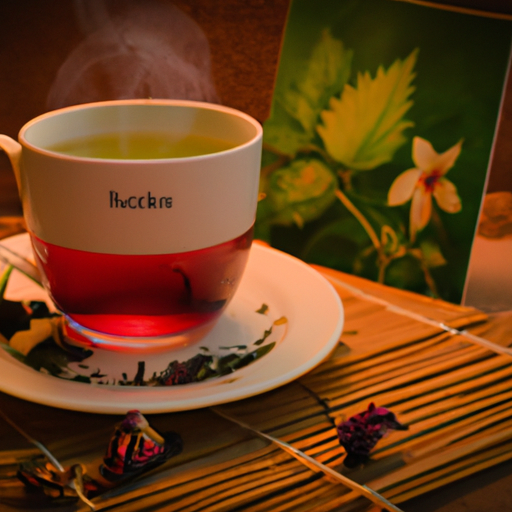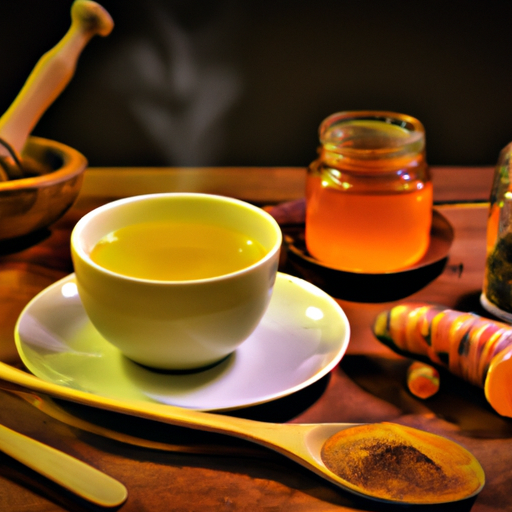Hello, health aficionados! Are you bored with your daily tea routine? Why not give turmeric tea a go?
Not only is it a refreshing and flavorful beverage, but it also has numerous health benefits that can improve your overall well-being. Turmeric has been used for centuries in traditional medicine practices and is known for its anti-inflammatory properties.
It contains curcumin, which has been shown to help with pain relief, digestive issues, and even depression. By incorporating turmeric into your diet through drinking tea, you can reap these benefits while enjoying a delicious and soothing beverage.
So let’s dive into how to make the perfect cup of turmeric tea!
Key Takeaways
- Turmeric tea has many health benefits, including anti-inflammatory properties, pain relief, improved brain function, and weight management.
- To prepare turmeric tea, ground turmeric is added to hot water and simmered for 10 minutes. Fresh turmeric root can also be grated for added flavor.
- Turmeric tea can be paired with black, green, or herbal tea for enhanced flavor and health benefits, and can be served hot or iced and sweetened or unsweetened.
- Turmeric supplements should be chosen from reputable brands with high-quality ingredients, and turmeric can also be used in cooking techniques like sautéing, roasting, and simmering.
The Health Benefits of Turmeric
You’re going to love how sipping on a warm cup of turmeric tea can boost your health with its anti-inflammatory properties and antioxidants. Turmeric has been used for centuries as a natural remedy to treat various ailments. It contains curcumin, which is the main active ingredient responsible for its many health benefits.
Not only does it help reduce inflammation in the body, but it also aids in digestion and promotes healthy skin. If you’re not a fan of taking turmeric supplements or cooking with turmeric in your meals, then drinking turmeric tea is an easy way to incorporate this powerful spice into your diet.
By simply adding a few teaspoons of ground turmeric to hot water, you can create a delicious and nutritious beverage that will leave you feeling great. Plus, making your own turmeric tea at home allows you to control the ingredients and avoid any added sugars or preservatives.
Now that you know about the amazing health benefits of turmeric, let’s gather our ingredients and start brewing some delicious tea!
Gathering Your Ingredients
Once you’ve got all your ingredients rounded up, it’s smooth sailing from there. Turmeric is the most important ingredient, so make sure to find a good source for it. You can buy fresh turmeric root at a farmer’s market or health food store and grate it yourself, or you can use ground turmeric powder that can be found in most grocery stores.
When measuring out your ingredients, keep in mind that this recipe makes about two cups of tea. For fresh ginger and extra flavor, grate about an inch of ginger root and add it to the pot with the turmeric. Use about four cups of water and bring it to a boil on medium-high heat. Once boiling, reduce heat to low and let simmer for 10 minutes.
It’s important to store any leftover tea properly as well. I recommend pouring any unused tea into a glass jar with a tight-fitting lid and storing it in the refrigerator for up to three days. This way, you can enjoy your delicious turmeric tea whenever you want without having to start from scratch each time!
Now that we’ve got our ingredients measured out and stored correctly, let’s move on to choosing our base tea for added benefits.
Choosing Your Tea Base
To take your turmeric beverage to the next level, why not try adding a tea base that complements its earthy flavor? The type of tea you choose will affect the overall taste and health benefits of your drink.
Black tea is a popular choice for those who want a stronger flavor, while green tea provides a more delicate taste. Herbal teas like chamomile or peppermint can also be used as a base, depending on your personal preference.
When choosing your tea base, consider experimenting with different flavor combinations. For instance, pairing turmeric with ginger tea can create a spicy and warming drink that’s perfect for chilly evenings. Adding honey or lemon to green tea and turmeric can provide an extra boost of antioxidants. You could even mix in some cinnamon or cardamom for added depth.
Now that you’ve chosen your preferred type of tea, it’s time to prepare your turmeric. Start by peeling and grating fresh turmeric root or using pre-ground turmeric powder. Combine the turmeric with hot water in a saucepan and bring it to boil before reducing heat to simmer for 5-10 minutes.
Add your chosen tea bag or loose leaf and let it steep for another 2-3 minutes before straining into your cup. Enjoy!
Preparing Your Turmeric
Before making turmeric tea, it’s important to prepare your turmeric properly. First, I like to peel and grate my turmeric root to make it easier to work with. Then, I often roast the grated turmeric in a dry skillet for a few minutes to enhance its flavor and aroma.
By taking these simple steps, you can ensure that your turmeric tea has the best possible taste and health benefits.
Peeling and Grating
Peeling and grating the turmeric root may seem like a tedious task, but it’s worth the effort for the rich flavor and health benefits it adds to your tea.
To peel the turmeric root, I usually use a spoon or vegetable peeler. I find that using a spoon is more effective as it removes only the thin outer layer of skin while leaving most of the flesh intact.
After peeling, I like to grate my turmeric root into small pieces using either a box grater or a food processor. If you’re using a food processor, be sure to cut your turmeric root into smaller chunks before adding it in.
Grating will help release more of its potent compounds into your tea and also make it easier for them to dissolve in hot water.
With our turmeric now prepped, we can move on to roasting it for an even richer flavor.
Roasting
After peeling and grating the turmeric root, the next step is to roast it. Roasting enhances the flavor of turmeric and brings out its earthy aroma. To do this, I place the grated turmeric on a baking sheet and roast it in the oven for about 10 minutes at 350°F. It’s important to keep an eye on it while roasting to prevent burning.
Roasting also has health benefits as it increases the bioavailability of curcumin, a compound found in turmeric that has anti-inflammatory properties. Studies have shown that consuming roasted turmeric can improve digestion, boost immunity, and even reduce inflammation-related pain. Incorporating roasted turmeric into my daily routine has been an easy way to reap these benefits without having to take supplements or medication. Now that my turmeric is roasted, it’s time to brew my tea!
Brewing Your Tea
First, you’ll want to bring a pot of water to a boil. Once the water is boiling, add 1 teaspoon of ground turmeric and reduce the heat to low. Let the spice simmer for about 5 minutes or until the water turns a bright yellow color.
Now it’s time to let your tea steep! Cover the pot with a lid and turn off the heat. Allow the mixture to sit for another 5-10 minutes so that all of the flavors can meld together.
During this time, I like to take some deep breaths and enjoy the aroma of my freshly brewed turmeric tea.
To serve, strain out any remaining bits of turmeric using a fine mesh strainer or cheesecloth and pour into your favorite mug. Add honey or lemon juice if desired for added sweetness or tartness.
Now that your delicious turmeric tea is ready, it’s important to know how to properly store it so that you can enjoy it later on.
Serving and Storing Your Turmeric Tea
Now that I’ve made my turmeric tea, it’s time to talk about how to serve and store it.
One important decision is whether to enjoy it hot or iced.
I’ll also share some tips for storing the leftover tea so that it stays fresh and flavorful.
Hot vs. Iced
For a refreshing twist, why not try making iced turmeric tea instead of the traditional hot version? Here are three things to keep in mind when deciding between the two:
-
Hot vs. Iced: The biggest difference between hot and iced turmeric tea is obviously temperature. While hot tea is perfect for those chilly days, iced tea can be a great way to cool down during summer months.
-
Sweetened vs. Unsweetened: Whether you prefer your turmeric tea sweet or unsweetened is another factor to consider. If you have a sweet tooth, try adding honey or sugar to your iced turmeric tea for an extra burst of flavor.
-
Preparation method: The preparation method for hot and iced turmeric teas differs slightly as well. For example, with hot tea, you’ll want to use boiling water and steep for several minutes, while with iced tea, you may want to cold brew overnight.
Now that we’ve explored the differences between hot and iced turmeric teas, let’s talk about storing your leftover tea!
Storage Tips
To keep your leftover turmeric tea fresh and flavorful, you’ll want to follow these simple storage tips. Proper storage is crucial in preserving the quality of your tea and prolonging its shelf life. One important factor to consider is the container options. Glass jars or airtight containers made of stainless steel are the best choices for storing turmeric tea as they prevent moisture from getting in and contamination from occurring.
Temperature control is also a key element in preserving flavor. It’s essential to store turmeric tea away from direct sunlight or heat sources that may affect its taste and aroma negatively. Another freshness indicator to check is avoiding moisture at all costs by keeping the container sealed tight after use. Lastly, be mindful of expiration dates as spices, including turmeric, tend to lose their potency over time even if stored correctly. With these tips in mind, you can ensure maximum enjoyment from every cup of homemade turmeric tea!
Moving on to our next topic: turmeric tea variations…
Turmeric Tea Variations
You can easily spice up your turmeric tea by adding a pinch of cinnamon or ginger, giving it a warm and cozy flavor. If you’re looking for a more indulgent treat, you may want to try making a turmeric latte instead. This variation adds frothy milk and honey to the mix, creating a creamy and decadent drink that’s perfect for sipping on a chilly evening.
For those who prefer bold and robust flavors, turmeric chai is an excellent option. This version incorporates traditional chai spices like cardamom, clove, and black pepper into the mix, resulting in a fragrant and aromatic beverage that’s both spicy and soothing at the same time. It’s also easy to customize this recipe based on your personal preferences – some people enjoy adding vanilla extract or nutmeg for an extra burst of flavor.
While turmeric tea is generally considered safe when consumed in moderation, there are some precautions you should take before incorporating it into your daily routine. For example, if you’re taking medication or have any underlying health conditions, it’s important to talk to your doctor first to ensure that there are no potential interactions or adverse effects. Additionally, consuming too much turmeric can cause digestive issues such as nausea or diarrhea – so be sure to start with a small amount and gradually increase as needed.
Precautions and Side Effects
Before incorporating turmeric into your daily routine, it’s important to be aware of the potential side effects and precautions. While turmeric is generally considered safe for consumption, excessive intake can lead to gastrointestinal problems such as nausea and diarrhea. It’s recommended that you don’t consume more than 1-2 teaspoons of ground turmeric per day.
Furthermore, if you’re taking any medication or have a pre-existing medical condition, it’s best to consult with your doctor before consuming turmeric. Turmeric may interact with certain medications such as blood thinners, diabetes drugs, and stomach acid reducers. Additionally, pregnant women should avoid consuming large amounts of turmeric as it may stimulate contractions.
Incorporating small amounts of turmeric in your diet by adding it to dishes or drinking turmeric tea is generally safe for most people. However, if you experience any adverse reactions while consuming turmeric, discontinue use immediately and seek medical attention.
Other ways to incorporate turmeric into your diet include using it as a spice in cooking or adding it to smoothies for an extra boost of antioxidants and anti-inflammatory properties.
Other Ways to Incorporate Turmeric into Your Diet
Now that we’ve covered the precautions and side effects of making turmeric tea, let’s explore other ways to incorporate this beneficial spice into our diets.
For those who may not be fans of drinking tea, there are turmeric supplements available in pill form.
Additionally, turmeric can easily be added to cooking for a flavorful boost in dishes like curries or roasted vegetables.
And for a refreshing twist on incorporating turmeric, try blending it into a smoothie with fruits and veggies for a nutrient-packed drink.
Turmeric Supplements
If you’re looking for a quick and easy way to enjoy the health benefits of turmeric, try adding a supplement to your daily routine. Turmeric supplements come in various forms such as capsules, powders, and liquid extracts.
Here are some things to consider when choosing a turmeric supplement:
- Look for one that contains black pepper extract or piperine which helps increase the absorption of curcumin.
- Check the dosage recommendations on the label and consult with your healthcare provider if you have any concerns.
- Choose a reputable brand that uses high-quality ingredients.
Adding turmeric supplements to your daily routine is an excellent way to reap its health benefits without having to prepare it yourself. However, if you prefer incorporating turmeric into your meals, keep reading about how you can use it in cooking.
Turmeric in Cooking
Using turmeric in cooking can add a burst of color and flavor to your dishes, much like adding a pop of color to a painting can enhance its beauty.
Turmeric has been used as a spice in traditional Indian cuisine for centuries, and it’s not hard to see why. Its bright yellow hue adds vibrancy to any dish, while its earthy and slightly bitter taste complements savory flavors.
Cooking techniques that work well with turmeric include sautéing, roasting, and simmering. One popular recipe is turmeric rice, where the spice is added to the water while cooking the rice. Another favorite is turmeric roasted vegetables, where chopped veggies are tossed with olive oil and a generous amount of ground turmeric before being roasted until tender.
With so many possibilities, there’s no shortage of ways to incorporate this versatile spice into your meals.
As we move on to discussing ‘turmeric smoothies’, I must say that blending this golden spice into your morning drink can be an excellent way to start your day off on the right foot!
Turmeric Smoothies
Adding turmeric to your morning smoothie can be a game-changer for your health routine. Not only does it add a pop of vibrant color, but it also provides numerous benefits for your body and skin. Turmeric smoothie recipes have become increasingly popular due to their ability to improve digestion, reduce inflammation, and provide an energy boost without the crash that comes with caffeine.
To give you an idea of how easy it is to incorporate turmeric into your daily smoothies, here’s a table with five simple yet delicious recipes:
| Recipe | Ingredients |
|---|---|
| Golden Glow Smoothie | Banana, pineapple, turmeric, ginger |
| Mango-Turmeric Smoothie | Mango chunks, banana, almond milk, turmeric |
| Berry-Turmeric Smoothie | Mixed berries (strawberry/raspberry/blueberry), coconut water/soy milk/almond milk etc., turmeric |
| Turmeric Latte Smoothie | Almond milk/coconut milk/cashew nut milk/hazelnut milk etc., medjool dates/maple syrup/agave nectar/honey etc., ground cinnamon/cardamom powder/vanilla extract/nutmeg powder etc., grated ginger/turmeric root |
| Apple-Carrot Turmeric Smoothie | Carrots or apple juice (freshly squeezed/packaged), frozen banana slices/spinach leaves/kale leaves/mango chunks/pineapple pieces/etc., grated ginger root/freshly squeezed lemon/lime juice/turmeric |
Apart from its digestive benefits and anti-inflammatory properties that help fight off illnesses like colds and flu as well as certain types of cancer such as colon or breast cancer; incorporating turmeric into your diet is known to have multiple skin benefits too. Curcumin present in turmeric has been found to prevent acne breakouts by inhibiting excess sebum production and reducing inflammation; it also helps in the lightening of pigmentation, which in turn, gives you a brighter complexion. Overall, making turmeric smoothies a part of your daily routine can do wonders for both your health and skin.
Moving on to final thoughts and takeaways, there are various ways to incorporate turmeric into your diet to reap its benefits. While turmeric tea and cooking with turmeric are popular options, adding it to your morning smoothie is an easy way to make it a regular part of your diet. With numerous recipes available online, you can experiment until you find the perfect blend that works for you. So go ahead and give these recipes a try for a delicious yet healthy twist to your morning routine!
Final Thoughts and Takeaways
Overall, you now have a delicious and healthy way to enjoy the benefits of turmeric with your daily cup of tea. Drinking turmeric tea regularly can help improve digestion, boost immunity, reduce inflammation, and even improve brain function.
The best time to drink turmeric tea is in the morning or before bed as it can help kickstart your day or promote relaxation and sleep.
When making turmeric tea, be sure to add black pepper as it helps increase the absorption of curcumin – the active ingredient in turmeric. You can also add other ingredients like ginger, honey, lemon or cinnamon for added flavor and health benefits. Experiment with different combinations until you find one that suits your taste buds.
Incorporating turmeric tea into your daily routine is a simple yet effective way to reap its many benefits. Whether you prefer it hot or iced, plain or spiced up with other ingredients, make sure that you are enjoying this potent anti-inflammatory drink at least once a day for optimal results.
Cheers to good health!
Frequently Asked Questions
Can turmeric tea be consumed by pregnant women?
As an expectant mother, I understand the importance of being cautious with what I consume. When it comes to turmeric tea, there are mixed opinions on whether it’s safe for pregnant women to drink.
While turmeric is generally considered safe in food amounts, consuming large amounts or taking supplements during pregnancy is not recommended as it may stimulate the uterus and potentially cause complications.
It’s always best to consult with your healthcare provider before incorporating any new food or drink into your diet, especially during pregnancy. As the old adage goes, “better safe than sorry.”
Ensuring turmeric tea safety is crucial for the health of both mother and baby during this important time.
What is the recommended amount of turmeric to add in a cup of tea?
When it comes to adding turmeric to my tea, I’ve found that a good rule of thumb is to use about 1/2 teaspoon per cup. This allows for a decent amount of flavor and potential health benefits without overpowering the other flavors in the tea.
Of course, some people may prefer more or less depending on their personal taste preferences. When brewing turmeric tea, it’s important to remember that the spice can be quite potent and strong, so I like to add a small pinch of black pepper as well. This helps to activate the curcumin in turmeric and enhance its benefits.
Overall, incorporating turmeric into my tea routine has been a great way to add some extra nutrition and flavor into my day.
Can I add milk or honey to my turmeric tea?
When it comes to adding flavor to turmeric tea, you have two options: spices or sweeteners. While some people prefer to keep it simple and just add a dash of cinnamon or ginger, others like to sweeten their tea with honey or other natural sweeteners. Personally, I like to add a little bit of both for a balanced taste.
However, it’s important to note that while adding milk can make your turmeric tea creamier and more enjoyable for some people, it may also decrease the bioavailability of the curcumin in turmeric. So if you’re drinking turmeric tea for its health benefits, you may want to skip the milk.
Speaking of health benefits, many people wonder whether taking turmeric supplements is more effective than drinking turmeric tea. The truth is that both methods have their pros and cons – supplements are more concentrated and convenient but lack the other beneficial compounds found in whole foods like fresh turmeric root or brewed tea.
Ultimately, it’s up to personal preference and lifestyle which method works better for you.
How often should I drink turmeric tea for maximum health benefits?
Drinking turmeric tea has numerous health benefits, and I’ve found that incorporating this beverage into my daily routine has been extremely beneficial for me. When it comes to the best time to drink turmeric tea, I like to enjoy a cup in the morning with breakfast or in the evening after dinner.
This allows me to take advantage of the anti-inflammatory properties of turmeric and also helps aid digestion. Additionally, drinking turmeric tea regularly can help boost immunity and improve cognitive function.
While there’s no set rule on how often you should drink turmeric tea for maximum health benefits, incorporating it into your daily routine can certainly have positive effects on your overall well-being.
Can turmeric tea help with weight loss?
I’ve found that drinking turmeric tea can certainly aid in weight loss and improve digestive health. Turmeric contains compounds that have been shown to increase metabolism and decrease inflammation, which can help with weight loss.
Additionally, the anti-inflammatory properties of turmeric can also promote better digestion and relieve digestive issues such as bloating or constipation. While it’s important to note that drinking turmeric tea alone won’t lead to significant weight loss, incorporating it into a healthy diet and exercise routine can certainly be beneficial for overall health and wellness.
Conclusion
In conclusion, making turmeric tea is a simple and enjoyable way to reap the numerous health benefits of this potent spice. Turmeric has anti-inflammatory properties and can reduce oxidative stress in the body, aiding in the prevention and treatment of a variety of ailments.
By following the steps outlined in this article, you can easily incorporate turmeric tea into your daily routine. There are endless variations to suit your taste preferences, whether you prefer a classic blend with black tea or opt for a caffeine-free herbal option.
Remember to exercise caution when using high doses of turmeric and consult with a healthcare professional if you have any concerns or experience side effects. Overall, adding turmeric to your diet through delicious and easy-to-make beverages like turmeric tea can be an effective way to support your overall health and well-being.
So why not give it a try? Your taste buds (and body) will thank you!









